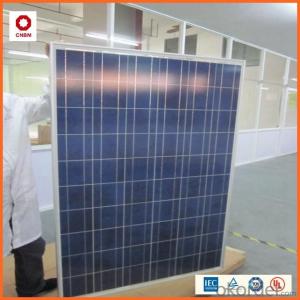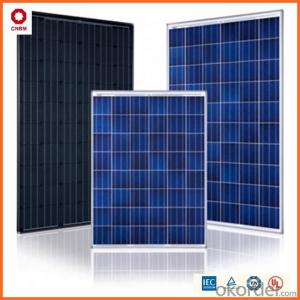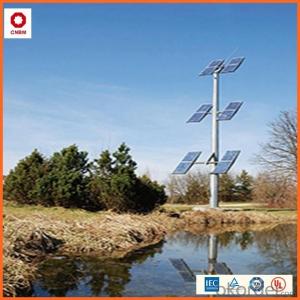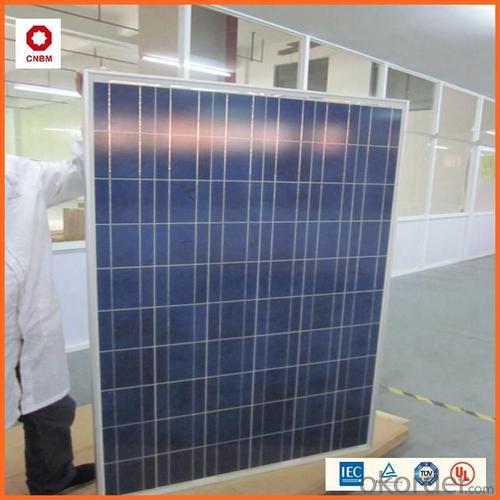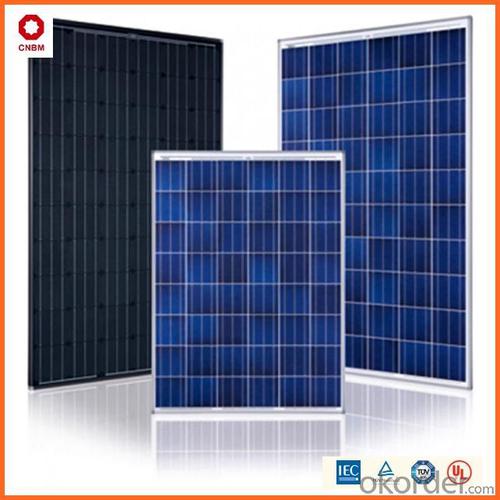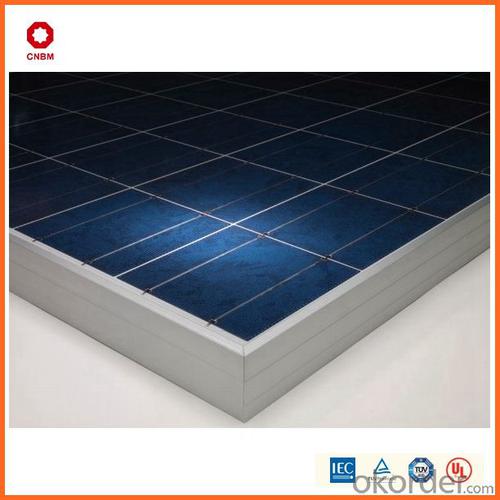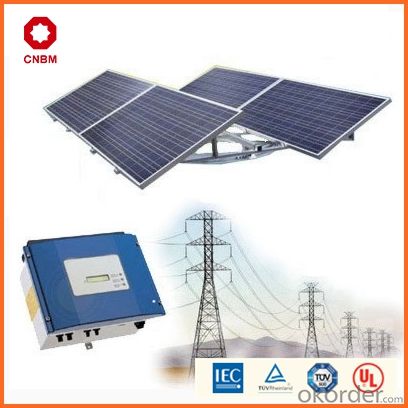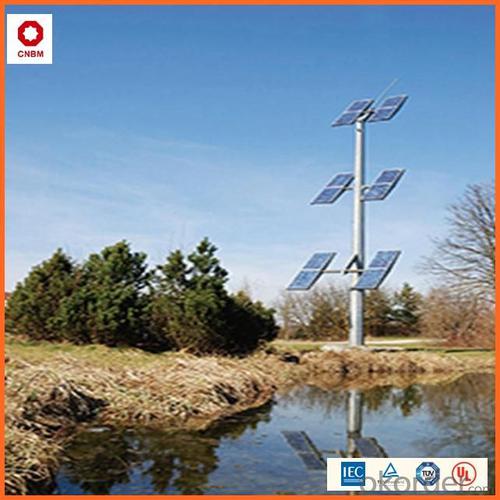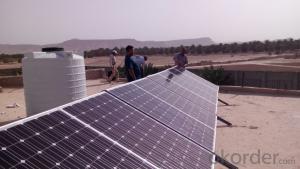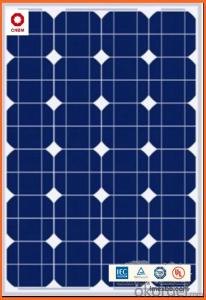Psr Solar Energy Systems 35w Small Solar Panels with Good Quality
- Loading Port:
- China main port
- Payment Terms:
- TT OR LC
- Min Order Qty:
- 1 watt
- Supply Capability:
- 10000000 watt/month
OKorder Service Pledge
OKorder Financial Service
You Might Also Like
Specification
Product Description:
Hot Sale !!! Quality and Safety of Small Poly Solar Panel 25~85w
1. Rigorous quality control meets the highest international standards.
2. High-transmissivity low-iron tempered glass, strong aluminium frame.
3. Using UV-resistant silicon.
4. IS09001/14001/CE/TUV/UL
Warranties of Small Poly Solar Panel 35~85w
1. 10 years limited product warranty
2. 15 years at 90% of the minimal rated power output
3. 25 years at 80% of the minimal rated power output
Specification
Characteristics of Poly solar panels CNBM (25-85W) | |||||
Max Power Voltage Vmp(V) | 30.3 | 30.8 | 31.1 | 31.4 | 31.85 |
Max Power Current Imp(A) | 7.60 | 7.64 | 7.73 | 7.81 | 7.85 |
Open Circuit Voltage Voc(V) | 36.1 | 36.6 | 37 | 37.3 | 37.68 |
Short Circuit Current Isc(A) | 8.50 | 8.55 | 8.65 | 8.75 | 8.85 |
Max Power Pm(W) | 230W | 235W | 240W | 245W | 250W |
Temperature Coefficient of Cells Poly solar panels CNBM (25-85W) | |
NOCT | 45± 2 |
Temperature Coeffucients of Isc | 0.0492 |
Temperature Coeffucients of Voc | -0.3374 |
Temperature Coeffucients of Voc | -0.4677 |
Mechanical Data of Poly solar panels CNBM (25-85W) | |
Dimension | 1638 × 982 × 40 mm |
Weight | 19.5 kg |
No. of Cells and Connections | 60 (6 ×10) |
Tolerance | 0 ~ + 5 W |
Cell | Monocrystalline Cell 156 × 156 mm |
Packing | 624 Pcs/40ft(H) Container |
Limits of Poly solar panels CNBM (25-85W) | |
Operating Temperature | -40 to +85 |
Storage Temperature | -40 to +85 |
Max System Voltage | 1000VDC(IEC) / 600VDC(UL) |
Features of our products:
• High conversion efficiency mono/poly-crystalline amorphous silicon solar cells
• Modules incorporate high performance bypass diodes to minimize the power drop caused by shading
• High transmittance, low-iron tempered glass
• High performance EVA encapsulant to prevent destroying and water.
• AI frame: without screw, corner connection. 8 holes on the frame can be installed easily
• Good performance of preventing from atrocious weather such as wind and hails
• Certifications: CE IEC TUV VDE UL, Class I
• 10 years 90% power output warranty

Shipping of Small Poly Solar Panel 25~85w
By Sea | Delivery from Shanghai or Ningbo seaport |
By Air | Departure from Shanghai Pudong Airport |
By Express | Post by DHL, EMS, UPS, TNT. |
- Q: Can solar energy be used during power outages?
- Yes, solar energy can be used during power outages. Solar panels generate electricity from sunlight, which can be stored in batteries for later use. This stored energy can then be used to power essential appliances and devices during power outages, providing a reliable source of electricity even when the grid is down.
- Q: Can solar energy systems be used in powering hotels or resorts?
- Certainly, hotels and resorts can make use of solar energy systems to power their facilities. Solar power is a renewable and clean energy source that can effectively meet the energy requirements of these establishments. Hotels and resorts typically consume a substantial amount of energy for various purposes, such as lighting, heating, cooling, and running electrical appliances and equipment. To harness the abundant sunlight, hotels and resorts can opt to install solar panels on their rooftops or in open areas. This allows them to convert sunlight into electricity, which can then be used to power the entire facility. By doing so, these establishments reduce their dependence on traditional energy sources, resulting in a decreased carbon footprint. In addition to its environmental advantages, solar energy systems can offer financial benefits to hotels and resorts. By generating their own electricity, these establishments can significantly lower or eliminate their utility bills, leading to substantial cost savings in the long run. Furthermore, some countries provide incentives, grants, or tax credits for the implementation of solar power systems, making such installations economically viable. Moreover, the availability of solar energy is not limited to sunny days. With advancements in technology, solar panels can still generate electricity even during cloudy or overcast conditions. Furthermore, any excess energy produced during peak sunlight hours can be stored in batteries for later use, ensuring a steady power supply throughout the day and night. By adopting solar energy systems, hotels and resorts can demonstrate their commitment to sustainability and environmental responsibility. This can serve as a valuable marketing tool, attracting environmentally conscious guests who prefer eco-friendly accommodations. It also aligns with the growing trend of sustainable tourism, enhancing the reputation and competitiveness of these establishments in the industry. Overall, solar energy systems are a practical and efficient solution for powering hotels and resorts. They offer a multitude of benefits, including reduced utility costs, environmental sustainability, and increased market appeal. As technology continues to advance and become more affordable, more hotels and resorts are embracing solar power as a reliable and clean energy source.
- Q: Can solar energy systems reduce electricity bills?
- Yes, solar energy systems can reduce electricity bills. By harnessing energy from the sun, these systems generate electricity that can power homes and businesses, significantly reducing reliance on traditional electricity sources. This can lead to substantial savings on monthly electricity bills, especially when combined with net metering or feed-in tariffs. Additionally, solar energy systems require minimal maintenance and have a lifespan of 25-30 years, making them a cost-effective long-term investment.
- Q: Can solar energy systems be used for powering healthcare facilities?
- Yes, solar energy systems can definitely be used to power healthcare facilities. Solar panels can generate electricity to run medical equipment, lighting, and heating or cooling systems in hospitals, clinics, and other healthcare facilities. This renewable energy source is not only environmentally friendly but also reliable and cost-effective in the long run, making it a suitable option for powering healthcare facilities, especially in areas with limited access to the electrical grid.
- Q: Can solar energy systems be used for swimming pool heating?
- Yes, solar energy systems can indeed be used for swimming pool heating. Solar panels can be installed to capture sunlight and convert it into heat energy, which can then be used to warm the pool water. This environmentally-friendly and cost-effective method of pool heating is becoming increasingly popular as it utilizes renewable energy and reduces reliance on traditional heating methods.
- Q: What is a photovoltaic (PV) system?
- A photovoltaic (PV) system is a technology that converts sunlight into electrical energy using solar panels. These panels are made up of multiple solar cells that capture photons from the sun and release electrons, generating a direct current (DC) electricity. This DC power is then converted into alternating current (AC) electricity through an inverter, making it suitable for use in homes, businesses, and other electrical applications. PV systems are a clean and renewable energy source, contributing to reducing greenhouse gas emissions and dependence on fossil fuels.
- Q: Can solar energy systems be used in areas with limited land availability?
- Yes, solar energy systems can be used in areas with limited land availability. There are various types of solar energy systems that can be installed in such areas, including rooftop solar panels, solar parking canopies, and solar walls. These systems utilize the vertical space available and can be integrated into existing structures, making them suitable for areas with limited land availability. Additionally, advancements in solar technology have made it possible to generate more electricity from smaller areas, further increasing the feasibility of solar energy systems in limited land areas.
- Q: Can solar energy systems be installed in areas with high snowfall?
- Yes, solar energy systems can be installed in areas with high snowfall. However, it is important to consider the design and installation of the system to ensure optimal performance and prevent damage from heavy snow loads. Strategies such as mounting the panels at an angle, using snow guards, and regular snow removal can help maximize energy production in snowy conditions.
- Q: Can solar energy systems be used in rural areas without access to the grid?
- Solar energy systems are definitely able to be utilized in rural areas that lack access to the grid. In reality, solar power can serve as an ideal solution for off-grid locations as it captures energy from the sun and converts it into electricity without relying on conventional power sources. Sunlight can be captured by installing solar panels on rooftops or in open spaces, which can then be converted into usable electricity through an inverter system. This electricity can be utilized to power a wide range of appliances and devices, providing electricity for lighting, charging mobile phones, operating small appliances, and even powering agricultural equipment or water pumps. Furthermore, any excess energy generated during the day can be stored in batteries for use during nighttime or overcast days. Solar energy systems present a sustainable and dependable electricity source for rural communities, decreasing their reliance on costly and unreliable generators that run on fossil fuels or traditional power grids.
- Q: How long does it take for a solar energy system to pay for itself?
- The payback period for a solar energy system varies depending on various factors such as the initial cost, energy usage, local solar incentives, and financing options. On average, it typically takes around 5 to 10 years for a residential solar energy system to pay for itself through energy savings. However, with decreasing installation costs and increasing energy prices, the payback period is often shorter nowadays. Additionally, commercial and utility-scale solar systems may have different payback periods due to their larger scale and potential tax benefits.
Send your message to us
Psr Solar Energy Systems 35w Small Solar Panels with Good Quality
- Loading Port:
- China main port
- Payment Terms:
- TT OR LC
- Min Order Qty:
- 1 watt
- Supply Capability:
- 10000000 watt/month
OKorder Service Pledge
OKorder Financial Service
Similar products
Hot products
Hot Searches
Related keywords
